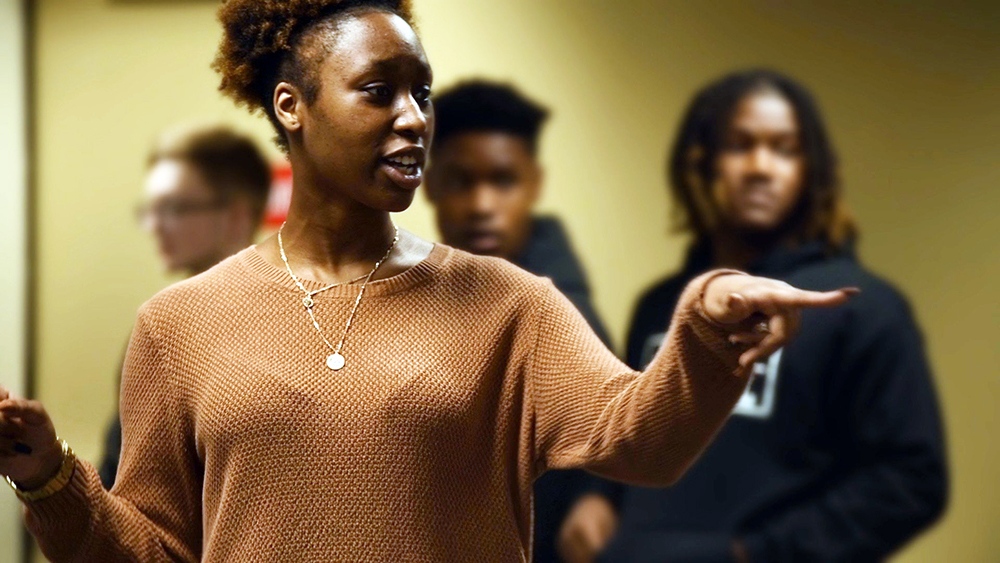Even before its premiere at Indie Memphis 2023, directors Joann Self Selvidge and Sarah Fleming’s film Juvenile: 5 Stories received Evident Change’s 2023 Distinguished Achievement Award. This is given to pieces of media that offer “profound insight into the realities of our nation’s social system and the way they impact people and communities.”
The award almost seems like it was made for the film, given the journey it takes audiences on through the true stories of five individuals whom the filmmakers describe as “justice involved” as teens.
The film dives into the lives of Shimaine Holley from Georgia; Ja’Vaune Jackson from Illinois; Romeo Gonzalez from Brooklyn, New York; Ariel Cortez from California; and Michael Dammerich from rural Missouri, as they share their stories and reflect on the many factors that contributed to becoming enmeshed in the juvenile justice and foster care system. Each of the subjects comes from different backgrounds, both geographically and demographically. However, as the filmmakers note, “as their individual narratives unfold in the film, a cohesive narrative emerges of the broken promises of our juvenile system across all American communities.”
The project began in 2017 as part of the National Juvenile Defender Center’s Gault at 50 campaign, which celebrated the landmark 1967 Supreme Court decision In re Gault that gave people under the age of 18 the right to due process in the legal system. This was years after it was announced that the Shelby County Public Defender’s office would be required to offer juvenile defender services. Selvidge was inspired to create a series of short films through her production group True Stories Pictures, which shines a spotlight on the experience of juvenile defendants in Shelby County. One of those films, “Viola,” won awards at both the Indie Memphis and Oxford Film Festival.
After completing these shorts, Selvidge and Fleming knew they wanted to expand their project to feature young people from across the country to show where “transformational change was happening.” The initial goal was to expose people in Memphis and elsewhere to new ideas that were being developed in the juvenile justice system.
Selvidge explains that they began developing networks through people on X (formerly Twitter) who were doing work within youth justice. They connected with people across the country including New York, Chicago, and St. Louis through advocacy organizations, youth defender organizations, and more.
One of the most profound components of the film is hearing the stories told by the people who experienced the inequities of the system first-hand. According to Selvidge, this was intentional. During production, the filmmakers conducted on-camera interviews with academics who study the subject and other experts in juvenile justice. But those interviews, while informative, were eventually relegated to appear on the project’s website. The film is filled with stats and facts, but the bulk of the information is imparted by the real experts — those who experienced incarceration and emerged to tell their stories. “We wanted to focus on the young people who’ve had these experiences as the experts on the system, and learn from them the different ways their experiences can teach us how to not make mistakes with current and future generations of young people who are being harmfully treated by the system,” Selvidge says.
Shimaine Holley says sharing her story was not easy, but it’s what she does. And she wanted to tell it as bluntly as possible. “Because this was a film documentary, I did want to be very cutthroat, so they’ll know what actually went on. I feel like it was needed for this specific space because of the audiences we knew that we were probably going to attract.”
When thinking about the intended audience for the film, Selvidge says they wanted it to be seen by people who are ready to take action, to partner with young people to change the system. Even those who feel they are not directly impacted by the juvenile justice system need to take note, Selvidge says, because their tax payments “enable these systems to thrive. … I think about the ways in which people, who aren’t thinking of themselves as being directly impacted, are indirectly impacting the lives of these children by the choices that they make with the ballot box, and the ways that their elected leaders are using their funds to sustain these types of systems that are doing real harm to our young people and their families.”
Juvenile: 5 Stories premieres Friday, October 27th, at Playhouse on the Square as part of the Indie Memphis Film Festival and streams on Eventive, October 24th-29th, as part of the virtual festival.
